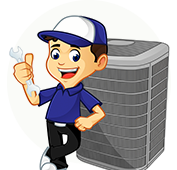
Congratulations on becoming a new homeowner! This exciting milestone comes with a set of responsibilities, and one of the most crucial aspects to understand is your HVAC (Heating, Ventilation, and Air Conditioning) system. Whether you’ve moved into a new construction or an existing home, knowing how to maintain and care for your HVAC system is essential. In this article, we’ll provide you with the top 10 things you need to know to ensure your new home HVAC system operates efficiently for years to come.
- Prioritize Regular Maintenance: One of the keys to a long-lasting, efficient HVAC system is regular maintenance. As a homeowner, it’s essential to schedule annual HVAC maintenance appointments with a qualified technician. These professionals can assess your system’s efficiency, identify any potential issues, and ensure it remains in excellent condition. Even if your HVAC unit appears to be working fine, annual check-ups help maximize energy efficiency and overall performance.
- Familiarize Yourself with External Components: While you don’t need to become an HVAC expert, getting acquainted with the external components of your system is wise. Identify major parts like the condenser coil, compressor, electrical components, and fan. This knowledge can help you recognize potential problems early on and prevent costly breakdowns.
- Check Your Thermostat: Your thermostat is a critical component of your HVAC system. A malfunctioning thermostat can lead to inefficient heating and cooling, poor temperature control, and higher energy bills. Sometimes, new homeowners think their thermostat has broken down when it is something simple like a battery replacement that is needed. Also, upgrading to a programmable thermostat can improve energy efficiency and home comfort.
- Regularly Replace Filters: Air filters play a crucial role in your HVAC system by trapping dust, debris, and allergens. Over time, they become dirty and clogged. To maintain good indoor air quality and efficient airflow, replace your air filters every three months. If you have pets, you may need to change them more frequently. Monitor how quickly they get dirty to establish a replacement schedule.
- Inspect Your Insulation: Effective insulation is vital for HVAC system efficiency. For homes with existing construction, have your insulation inspected to ensure it’s still effective. Poor insulation can lead to energy waste and uneven heating and cooling. Consider blown-in attic insulation, which provides an airtight seal, reduces noise pollution, improves indoor air quality, and can save you on heating and cooling bills.
- Watch for Warning Signs: Stay vigilant for warning signs that your HVAC system might be in trouble. Unusual noises, temperature inconsistencies, and spikes in your electricity bill are red flags. Address these issues promptly by scheduling a service appointment with a professional technician. Swift action can prevent minor problems from turning into costly repairs.
- Understand Indoor Air Quality: Indoor air quality is essential for a healthy home environment. Factors like pet dander, airborne debris, and humidity levels impact air quality. Regularly replacing air filters helps, but you can also consider additional solutions such as portable air purifiers, air scrubbers, and dehumidifiers to maintain superior indoor air quality.
- Prepare for Storms: Inclement weather, including storms, can damage external HVAC components. Protect your investment by securing outdoor furniture, grills, and decorations before a storm hits. Prune dead tree branches that could potentially fall onto your unit, as debris can lead to costly repairs.
- Monitor Energy Costs: Keep a close eye on your energy bills, even as a new homeowner. Sudden spikes or gradual increases in energy costs can signal issues with your HVAC system. Consult an HVAC technician to assess your system’s efficiency and performance if you notice unusual changes in your bills.
- Budget for Repairs and Maintenance: Prepare for inevitable HVAC repairs and maintenance costs by budgeting for them. Don’t skip annual maintenance appointments, even if your system seems to be functioning well. Trained technicians can detect and resolve problems before they inconvenience you. A proactive approach will save you money and keep your HVAC system running smoothly.
Being a homeowner comes with various responsibilities, and maintaining your HVAC system is a significant one. By following these 10 HVAC tips, you’ll ensure comfort and efficiency for you and your family in the years to come.
For more information or to schedule a service, please contact us today at (919) 746-4410.

